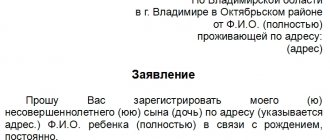Home / Acquiring real estate / Buying and selling / Buying an apartment
Back
Published: 03/12/2018
Reading time: 6 min
0
1130
Minor children can own residential premises on an equal basis with adult citizens, but children can dispose of their property (sell, donate, exchange, etc.) only with the consent of social protection authorities and their representatives - parents or guardians.
- Procedure for purchasing an apartment from a child
- Buyer's risks
- How to avoid risks
- Obtaining guardianship permission
What are the features of a share in an apartment as an object of ownership and the procedure for its alienation?
- The seller decides on the selling price.
- Then he warns the other participants in the shared ownership rights in writing about his intentions. The notification must indicate the value of the alienated property and the terms of the upcoming transaction.
- The co-owners must decide within a month to purchase part of the apartment on the specified conditions or refuse the transaction.
- If the addressees do not notify the seller of the decision within the established time frame, he has the right to sell the property to a third party.
- A written refusal of the share before 30 days allows you to proceed with the sale.
Since January 2020, the alienation of shares in an apartment without notarial participation is impossible (Article 24, Federal Law 122). Initially, owners were required to certify agreements between third parties. However, since January 2020, any transaction of shared alienation is carried out with notary support.
How can you avoid alienation of a share in an apartment?
Owners worry about their property, and they worry quite rightly. Often it is the share in the apartment that becomes the object of foreclosure. We are talking primarily about forced alienation: by the court, creditors, bailiffs, etc.
How to protect your share in an apartment from alienation:
- Defend your rights in court
This is relevant if the co-owners want to buy out a small share, but you are against such a decision. You will need to prove that the share, although insignificant, you have an interest in it and appear in the apartment.
Read “How to recognize a share in an apartment as insignificant,” as well as what follows from this and what to do?
- Select a share as a room
If the share corresponds to the living space, the co-owners will not be able to take it away. The housing standard per person is 12 m², but each region has its own (Article 50 of the Housing Code of the Russian Federation).
- Check documents
Compliance with the rules for acquiring a share excludes challenging the transaction. Study the ownership documents, check the data with the actual size of the shares, see if there are any restrictions on the disposal of shares?
- Close debts
If you have a debt to the bank, do not delay the proceedings until the court. It is better to come to the bank and ask for a deferment/installment plan. Most likely, the creditor will accommodate you – you will be able to restructure the debt and repay it in installments. If you do not violate the payment schedule, the bank will not file a claim and will not sue your share in the apartment.
So, we have considered the issue of alienation of shares in common property rights. There are voluntary and forced methods. The owner can execute any transaction and transfer the rights to his share to a third party. Popular operations are selling and donating to relatives. Alienation of a child's share requires the participation of guardianship authorities. If living conditions turn out to be worse, the PLO will not give consent to the transfer of the children's share.
Alienation of shares is a rather complicated operation. Legal transactions are fraught with many difficulties: refusal of registration, lack of documents, errors in applications, violation of the rights of owners, problems with BTI and OOP. It’s not easy to understand all the intricacies alone. Well, if you are faced with the seizure of your share for debts, you need the help of a lawyer. It is the lawyer who will be able to evaluate all the factors, draw arguments, check with the laws and give practical advice. If you need urgent advice, ask questions on our portal. We will help you dot all the i’s in housing issues.
See the video for details of the alienation of shares in the common right to an apartment:
Attention!
- Due to frequent changes in legislation, information sometimes becomes outdated faster than we can update it on the website.
- All cases are very individual and depend on many factors. Basic information does not guarantee a solution to your specific problems.
That's why FREE expert consultants work for you around the clock!
- via the form (below), or via online chat
- Call the hotline:
- Moscow and the Region
- St. Petersburg and region
- FREE for a lawyer!
Write your question and our lawyer will call you back within 5 minutes and for free
will advise.
Your question * Ask a question
Fill out the form with contact information and get a free consultation within 5 minutes.
Your name Phone number * Your city (region) * Send Thank you, Sasha! Your application is accepted
Expect a lawyer to call within 5 minutes
Ask another question
By submitting data you agree to the Consent to PD Processing, PD Processing Policy and User Agreement.
Anonymous Information about you will not be disclosed Quickly Fill out the form, and within 5 minutes a lawyer will contact you Tell your friends Rate (
1 ratings, average: 5.00 out of 5) Author of the article: Maxim PrivalovLegalist. 2 years of experience. I specialize in civil disputes in the field of housing and family law. Author rating Articles written 515
Legal aspects of selling an apartment with a share of a minor child
Keep in mind that a mandatory condition verified by the guardianship authority is the provision of ownership to the child of an equal share of the new apartment or other real estate. The absence of consent of the board of trustees entails the annulment of the legality of the transaction and its judicial termination, with the imposition of liability on its parties in accordance with the laws of the Russian Federation.
- If, when alienating an apartment with a child’s share, you do not plan to purchase other real estate, it falls on you
- the obligation to give the minor an equivalent share of other living space. Alternatively, in grandma's apartment or grandpa's house.
- If, along with the sale, you simultaneously buy another apartment, an equal-priced share in the new living space is immediately registered as the child’s property.
How does the purchase and sale of an apartment with minors work?
- After marriage. However, divorce is not a basis for limiting legal capacity. The only exception is fictitious marital relations.
- As a result of emancipation. This is a legalized process as a result of which a person becomes legally capable as a result of starting work under an employment contract or engaging in entrepreneurial activity.
- the size of the new apartment, its area;
- location relative to an educational institution (school or kindergarten);
- accommodations;
- technical equipment;
- compliance of sanitary standards approved by law;
- other circumstances taken into account in the interests of the child.
Sale of property of a minor child
Typically, guardianship and trusteeship authorities give consent to the alienation of a minor’s property only on the condition that other property will be acquired in the child’s name. Such agreement regarding “no problem” is obtained when an alternative transaction takes place, i.e. simultaneous sale and purchase, with the allocation of a share to the child. Article 2 37 of the Civil Code of the Russian Federation states: “The guardian does not have the right, without the prior permission of the guardianship and trusteeship body, to carry out, and the trustee does not have the right to consent to, transactions for the alienation, including the exchange or donation of the ward’s property, leasing it (lease), for free use or as collateral, transactions entailing a decrease in the property of the ward.”
Please note => Law on children of war Vologda region
Buying an apartment from a minor owner
- 17.6.2011
- 449
Such cases are becoming fewer and fewer, but they do arise. I can from the practice of our law office. The situation is this: a person purchased an apartment from a child. The guardian sold this apartment on behalf of the child. This was about 5-6 years ago, but the situation has arisen now. The apartment was not subsequently purchased for the child by the guardian, that is, he received the money, the buyer received the apartment, and moved into it. They didn’t buy an apartment for the child, that is, the child was left without housing. The court declared this sale and purchase transaction invalid, although there was consent from the guardianship and trusteeship authorities. The realtors turned out to be dishonest in that case. Realtors are in jail. But the buyer suffers. His deal was declared invalid. The bona fide purchaser suffered, and he is now proving in court that the transaction was valid. What is the procedure for purchasing an apartment from a minor owner? Rustam Tamindarov, director of the Legal Bureau: The child is the owner of either a share in the apartment or the entire premises. He cannot dispose of his property himself. This can be done for him either by his legal representatives, that is, his parents, or guardians, or trustees. A purchase and sale transaction when a minor is present is concluded only with the mandatory participation of the guardianship and trusteeship authority. The package of documents that is collected for alienation must contain a resolution on the consent of the guardianship and trusteeship authorities to the transaction. Moreover, they look at the housing for sale not only according to documents. A specialist must visit the site. They look at everything: the number of floors, the layout, the presence of a school nearby, the equivalence of the districts. Initially, the guardianship and trusteeship authorities give consent to a one-time purchase and sale. Moreover, registration occurs first when purchasing housing for a child, and then selling his apartment. Now, there is a bad moment here. How to reduce the risks of having a transaction invalidated when purchasing an apartment from a minor owner? It is imperative to ensure that a home is purchased for the child. The buyer needs to take the initiative into his own hands. It is necessary to check whether there is consent from the guardianship and trusteeship authorities. Transactions are registered on one day. What's the downside? The transfer of ownership in our country takes 28 days. First, the child gets a home, then his home is sold, that is, the deal goes the other way around. During these 28 days, check the package of documents, ask your lawyer to do this, spend some money and check the package of documents for the apartment that you are not purchasing, but which will be purchased for your child. Expert: Rustam Tamindarov, Director of the Legal Bureau
Subscribe to news:
How to sell an apartment with a minor child's share
When determining whether it is possible to sell an apartment with a minor share owner, a citizen will have to obtain permission from the board of trustees. It is he who makes the decision to conduct transactions in which a minor is involved. You should count on a positive decision only if the child is allocated a share in the new premises. The single size should not be less than the area that previously belonged to the minor citizen. The action is carried out on the basis of the relevant court decision. All persons who violate the law will be punished. If parents do not want to buy housing with the proceeds from the sale, they must provide the child with a share in any other apartment. This could be a room that belongs to a grandparent. If you plan to buy another home, parents have the right to sell the current property and immediately register a share in another apartment for the child. If for some reason it is impossible to provide housing for minors, the transaction will not be possible.
How to sell an “apartment with a child”
The guardianship and trusteeship authorities (CCA), branches of which are located in every municipal formation of St. Petersburg, are entrusted with the task of protecting the child from deterioration of living conditions (of course, this is not their only function, but in this case we are only interested in it). Therefore, parents who plan to make any transaction with housing that belongs - in whole or in part - to a minor will have to apply for the appropriate permission. The BN correspondent understood the topic and prepared some useful tips for readers.
A DIFFICULT AGE
According to current legislation, citizens are considered minors until they reach the age of 18. At the same time, until the age of 14, a child is effectively incapacitated. Parents (or guardians, if there are no parents or they have been deprived of parental rights) make decisions for him and sign documents. Starting from the age of 14, having received a passport, a citizen also receives the right to participate in transactions, but with the written consent of legal representatives - parents or those who replace them (not guardianship, but trusteeship is established over minors; the guardian does not completely replace the person, but only helps him to make reasonable decisions). It's good if these decisions are really reasonable. Meanwhile, it happens when parents - intentionally or not - get involved in deals that can not only worsen the child’s living conditions, but also leave him without a roof over his head. The PLO is called upon to prevent this. In cases where the child is simply registered in the apartment and is not the owner, no approvals from the guardianship authorities are required. Even if he is actually discharged “to nowhere.”
Permission from the guardianship and trusteeship authorities will be required not only when selling living space, but also when allocating shares in an apartment privatized into common joint property, when parents formalize a waiver of the right of first refusal to purchase a share in an apartment where the child is a co-owner, and in a number of other cases
UNITY AND DIVERSITY
But let's return to the situation when a child has a property right to an apartment. Then, to obtain permission for the transaction, you need to contact the guardianship and trusteeship authorities at the minor’s registered address. Even if the property that he owns is located in a different location. In order to obtain permission for a transaction, you will have to prepare a certain package of papers. Experts warn that, unfortunately, there are no regulations that would establish a list of required documents. Therefore, the requirements will differ in different departments of the PLO. Mandatory documents include title documents for the real estate being sold and acquired, as well as technical ones - describing the property (technical passport, extract from the Unified State Register of Rights on the absence of arrests and prohibitions on the acquired real estate, cadastral passport of the land plot - if an individual house is purchased). Guardianship authorities can request other documents from one or another government agency through a common information base.
Citizens are allowed not to provide the guardianship authorities with documents such as Form No. 9, birth certificate, marriage or divorce certificate - the inspector can request them independently. But it’s better to bring these documents yourself, save valuable time
WHO'S GOING TO COME?
Do both parents need to be present when submitting documents? Neither the Family Code nor the Civil Code require this - it says that the presence of one legal representative of the minor is sufficient. In practice, however, both may be required to appear. Especially if the family is, as they say, dysfunctional (usually the administrative regulations discussed above require the presence of two parents).
However, each situation is considered individually. Let's say the father's whereabouts are unknown. In this case, the mother who receives permission for a transaction involving a minor, in theory, needs to prove through the court that this person is missing. True, experts say that in most cases the guardianship authorities meet halfway: for example, they are content with a written statement that the father’s location cannot be determined, child support is not paid, etc.
When the required package of documents is completed, the inspector submits it to the municipality commission for consideration. The result of the discussion is an order signed by the head of the Moscow Region, which indicates under what conditions this deal can be concluded
IS IT GOOD AT THE NEW PLACE?
The main principle that guides the guardianship and trusteeship authorities when making decisions: the child’s share of property should not decrease, and living conditions should not worsen. However, the PLO commission may deviate from this rule and consider additional criteria of a technical and social nature.
Realtors tell a case when parents wanted to sell an apartment and buy a house in the garden. The area of the new facility was, of course, larger. But since the family was dysfunctional, the realtor understood that they would not be able to maintain such a house, pay for heating, etc. As a result, the deal was rejected.
On the other hand, there are situations when a family moves to an apartment whose area is slightly smaller (even from a two-room to a one-room apartment), but the quality is much higher. For example, the old object was located in a destroyed Khrushchev-era building, and the one being acquired is located in a house built recently. In this case, the deal may well be approved. But here, of course, a lot depends on the parents, who must explain all the nuances to the inspector and provide as much information as possible.
When purchasing a new building, parents run the risk of being rejected by the OOP. Firstly, the house must be at least 70% ready. Secondly, if a child is not specified in the equity participation agreements, this may also become an obstacle to the transaction
MEET ME IN COURT
If the transaction is nevertheless refused, the decision of the guardianship authorities can be challenged. To do this, you must receive a written refusal and submit an application to the court at the location of the PLO. According to officials, such cases are resolved quite quickly, often in favor of citizens. But complaints to the Social Policy Committee or the prosecutor's office are ineffective. The first actually has no leverage over the guardianship authorities and can only make recommendations. The prosecutor's office can help when there is a violation of the law. According to realtors, transactions involving minors are quite complicated. Particularly specific are chains of objects whose owners are other minors. Violation of the child's rights at the last link will lead to the cancellation of all these transactions. Realtors advise citizens who go to the guardianship authorities for permission to conduct a transaction not to conflict, but to achieve their goal through reasonable negotiations - to describe your situation to the inspector as fully and openly as possible, to show that you have a clear plan for improving your living conditions. The human factor plays a very important role in this case.
Not every home buyer with a “child burden” is ready to wait about 30 days until permission from the guardianship authorities is received
The editors of BN would be grateful if readers who are close to this topic would share their experience and talk about other nuances that would also be worth paying attention to when concluding transactions involving minor children.
The act of acceptance and transfer as the final point of the transaction
Depositing an apartment is a delicate matter
How to take money from the state to buy an apartment
Equity participation agreement: what to pay attention to
How to buy a house without defects
Text: Alexey Rezenkov Photo: Alexey Alexandronok
Alienation of a minor's share
Hello. Usually this period does not exceed one month. In some cases, it may be reduced, but you will still have to wait two weeks. It is possible that after a month of waiting, the guardianship and trusteeship authorities, instead of permission, will issue a written refusal to conclude a transaction with the sale of the property. In accordance with Ozhegov's Explanatory Dictionary, to alienate means to arrange something. wonderful, strange and unexpected, throw out (in 2 meanings). Well, what a thing you have alienated! And in this case, the expression alienation of property is used, that is, the transfer of things into the ownership of another person, which can be done in the form of donation, purchase and sale, or exchange.
Maternity capital and children's rights
Who has the pre-emptive right to purchase a share of the apartment? Photo No. 3
Legal actions affecting the interests of participants in shared ownership are carried out only by agreement of all parties (Article 246 of the Civil Code).
To some extent, the postulate violates the right to freely dispose of property. However, protection from attacks on the apartment by crooks of all stripes justifies the inconvenience.
The procedure for preferential redemption when alienating a part to an outside entity is set out in Art. 250 GK. How does everything work in practice?
- The seller decides on the selling price.
- Then he warns the other participants in the shared ownership rights in writing about his intentions. The notification must indicate the value of the alienated property and the terms of the upcoming transaction.
- The co-owners must decide within a month to purchase part of the apartment on the specified conditions or refuse the transaction.
- If the addressees do not notify the seller of the decision within the established time frame, he has the right to sell the property to a third party.
- A written refusal of the share before 30 days allows you to proceed with the sale.
Preemptive redemption is also required during exchange.
Purchase preferences do not apply if the share is sold through public auction.
How to sell an apartment with a minor child's share
To sell a share owned by a child, permitting documentation will be required. It should be taken into account that the minor owner must be provided with equivalent property. In case of violation of the specified rules, the transaction in court, upon the claim of the interested parties, is declared invalid. Restitution shall apply to the parties.
- Sale of a minor’s share in an apartment with the provision of new housing of identical or larger area. For example, registering part of a grandmother’s apartment as the child’s property.
- Conducting two transactions simultaneously: the sale and purchase of housing. This means that on the same day a transaction is concluded for the alienation of a share and the purchase of a new apartment or house with the registration of the ownership rights of a minor.
- If a minor has a living space for living, and additional property is sold, then the purchase of equivalent housing is not a mandatory procedure. In this case, the proceeds from the sale go to the child’s open bank account. Upon reaching 18 years of age, he will be able to use them.
Please note => Power of attorney to Sberbank for legal entities sample filling
How to alienate a share in an apartment from a minor relative
But sometimes citizens do not have the opportunity to contact Rosreestr due to the fact that this body is located far away or there are long queues there. Recently, it has become possible to submit documents to multifunctional centers that have taken on the responsibility of Rosreestr.
Documents are submitted to the authority that registers such transactions. It is none other than Rosreestr. There are cases when a minor can represent his interests independently upon reaching the age of sixteen. But this is possible only after the emancipation procedure, during which the child’s complete financial independence is proven, for example, if he is the owner of a business or earns money in other legal ways, that is, he is considered fully capable.
Procedure for selling an apartment with a share of a minor child
In the presence of an educational institution inspector, parents fill out an application in which they undertake to respect the rights and interests of their children. The inspector signs this statement. If the child is currently over 14 years old, then you will need to prepare written permission from both parents to sell and purchase a share in the apartment. In some cases, when parents do not intend to buy a new home after selling the old one, OOiP agree to open a personal account in the name of the child, where the amount from the sale of his share in the apartment will be transferred. The account is designed in such a way that only the child himself can receive money from it when he turns 18 years old.
Permission from the Guardianship and Trusteeship Authorities
The protection of the property rights of minor children in transactions for the purchase and sale of apartments is carried out by the Guardianship and Trusteeship Authorities, whose inspectors have fairly broad powers.
It is the Guardianship Authorities that are called upon to ensure that the rights of children during the alienation of real estate are not violated, and their share of property is not reduced as a result of the transaction. In particular, the task of the Guardianship Authorities, among other things, includes issuing permits for transactions with housing with the participation of a minor.
Such permission must clearly state the requirements, subject to which the sale of an apartment with the share of a minor child is permitted (see example below). These requirements of the Guardianship are mandatory, and if they are violated, the transaction may be declared invalid by the court at the request of the Guardianship Authorities or other interested parties.
As a rule, the requirements of the Guardianship Authorities are that the parents or legal guardian of the child register for him a share of ownership in another apartment, instead of the one sold. Thus, the sale of an apartment in which a minor child owns a share of the property turns into an alternative transaction (for more information about such transactions, see the link)
In some cases, for example, when a child has ownership rights in an apartment, but actually lives at a different address, it is allowed not to buy an alternative apartment and not to allocate a share in it. But then the Guardianship Authorities demand that an account be opened in the child’s name in Sberbank, and money for his sold share be transferred there. The minimum amount transferred to the child to this account is also established by the Guardianship.
The activities of the Guardianship and Trusteeship Authorities are regulated by Art. 31-41 Civil Code of the Russian Federation, clause 4, art. 292 of the Civil Code of the Russian Federation, as well as Federal Law-48 “On guardianship and trusteeship”.
Guardianship and trusteeship bodies are part of local executive authorities and local self-government (in Moscow - municipalities).
Coordinates
territorial guardianship and trusteeship authorities
Moscow and the Moscow region can be viewed
Here
.
♦ Package of documents for obtaining permission for “Guardianship” ♦
Permission from the Guardianship and Trusteeship Authorities for a transaction can be obtained if the sale of an apartment does not infringe upon the rights and legitimate interests of the child participating in the transaction. Those. the child’s share of property should not decrease, and living conditions should not worsen.
♦ Example of requirements of the Guardianship and Trusteeship Authorities ♦
The guardianship authorities review the package of documents and issue a written permission to sell indicating a specific object or a reasoned refusal. As a rule, it is not difficult to obtain permission if, along with the sale, you simultaneously purchase another property in which you undertake to allocate to the child a share in the property equal to the previous one, and at the same time, the living conditions and nearby infrastructure in the new apartment will be no worse, and possibly better, than in sold.
If you plan to move to another city after the sale, the guardianship authorities may meet you halfway and issue permission to sell with a deferment in the purchase of a new home.
Then you must deposit the money from the sale into a bank account opened in the child’s name and use it to pay for the new apartment after you find a suitable option.
Another special case is the sale of the property of a minor owner who is receiving state support (boarding schools, orphanages, etc.). In this case, the profit from the sale of real estate is also placed in a current account opened in the name of the child. He will be able to use the money after the age of 18, or earlier through official guardians with the permission of the guardianship and trusteeship authorities.
Child's share in the apartment
If we consider a situation where a mother and father, after a divorce, live in an apartment, and the child’s share is the basis for the child’s guardian (parent) to be in the apartment, the second parent really wants to buy out such a share, even at a very inflated price. Because if the child does not have a share, and the child himself, by court decision, must live with the other parent at a different place of residence, there will be no grounds for them to “invade” and live on the territory of the first parent. And vice versa. We had a rare situation when a house in the center was quietly bought by a foreign company. There were three shares in the one-room apartment - 1/3 belonged to the father, and 1/3 each to two minor children (11 and 12 years old). It was possible, instead of shares in this apartment, to give the children even significantly more space from their grandmother and the issue would have been resolved. But what would the father get from the sale of the one-room apartment? The question for the buyer was posed differently. We sell children's shares. What can the buyer offer that is so good that the guardianship agrees to the buyer's tempting offer? And the buyers actually offered. They gave triple the price for the children’s shares, and the guardianship agreed. Moreover, this money was not invested in a counter purchase, but was blocked in the account until we waited for the partial construction of the house (apartment), which we bought in the future with all the money from such a transaction. The sale of the children's two shares in the apartment turned into a lucky purchase of an unfinished three-ruble apartment of 80 m2 (This is a rare permission from guardianship). Of course, the registration of children was a separate issue.
Alienation of a share in an apartment
It is worth noting that the main difference between a gift transaction and a sale and purchase is its gratuitous nature. However, there are several nuances here too. The recipient may refuse a generous gift without explaining the reasons (for example, he does not want to pay additional property taxes, he does not want to pay for housing maintenance, etc.). In this case, the alienation of part of the apartment will not occur. Example. In 2008, the Ivanovs privatized the apartment. They became participants in shared ownership - each of them got ½ of the area. In 2012, Ivanov died and, according to his will, ½ of the property went to the children from his first marriage (who were adults) - N.V. Ivanov. and Skorodumova R.V. Thus, each of them had the right to dispose of ¼ shares of the apartment. Since the children from the first marriage and the deceased’s spouse were actually strangers to each other and could not live together, Ivanova S.K. offered to buy out their shares from the forced co-owners. Ivanov N.V. agreed and sold his part for a price that suited both. But Skorodumova wanted to get as much money as possible and deliberately inflated the price. Ivanova N.V. I wrote her a refusal and handed it to the co-owner against signature. Then Skorodumova sold her part of the house to a stranger. However, the cost of this deal was significantly lower than what she offered to Ivanova. So Ivanova went to court, where the sale of the share was declared illegal.
Please note => Benefits for children killed in war
How to alienate a share in an apartment?
In this case, the algorithm of actions will be similar, with the exception of the approval of the transaction by the guardianship authorities. It is necessary to pay attention to the following nuances when alienating a share in a residential building:
- an adult citizen can not only sell his part, but also enter into a gratuitous transaction (for example, a gift). In this case, the notification procedure is not provided for by law;
- notarization of the agreement when disposing of parts of a residential premises is necessary in all cases, even with a gratuitous transfer of ownership;
- Failure to comply with the above requirements will result in the transaction being declared invalid and the parties returning to their original position.
If the seller violated the rules on notification and granting other owners a pre-emption option, they will be able to go to court to transfer the rights under the original agreement to themselves. Such a requirement can be made within three months from the date of registration of the agreement in Rosreestr. If this claim is made simultaneously by several persons, they will distribute the acquired share among themselves in equal parts.
If only two citizens own the apartment, the notification procedure does not apply, but certification of the agreement by a notary cannot be avoided. In this case, after going through all stages of approval and registration of the transaction, the buyer will receive ownership of the entire apartment.
To take into account all the nuances when concluding a purchase and sale transaction of a share of an apartment owned by a child, contact our experienced lawyers by phone or online.
An apartment where there is a share of a minor owner: how to properly register and sell everything
- death of one of the parents (a death certificate is provided);
- deprivation of one of the parents of parental rights (a corresponding court decision is provided);
- recognition of one of the parents as missing (a corresponding court decision is provided);
- evasion by one of the parents from paying child support for six months (a corresponding certificate from the bailiff service is provided).
Submit a written application to the guardianship authorities at your place of residence. Both parents must sign the application, even if they are divorced and do not live together. If one of the parents is absent, he must have a notarized consent to the sale.
Advantages of a legal scheme
Purchasing a plot of land for a child is beneficial in two cases. In the first, the image of a “family nest” is relevant, where the heir understands from the first days: I will pass this on to my children and grandchildren. In such a situation, an agreement is drawn up for donating a plot of land to a son or daughter. The second is beneficial when parents do not want to show property to authorities and government bodies. Until the age of 18, a person’s civil rights are protected by law, and a land plot cannot be confiscated either by a court decision or by a bailiff’s writ of execution. And one more thing: if a child is registered in a residential building on a land plot, but does not appear as a co-owner, the consent of the guardianship authorities for the sale of the property is not required. It is issued from the first address and registered at the second. On our website you can select a plot for shared ownership of land with the participation of a child in modern cottage villages.
PRO new building (Moscow)
- If a minor apartment owner needs to move to another city for health reasons, for example, moving from a metropolis with a polluted atmosphere for a child with respiratory diseases.
- If a minor child needs expensive treatment.
- If it is necessary to move to a certain city for the child to receive a suitable education there.
It is strongly recommended that before submitting an advertisement for the sale and/or purchase of an apartment, you visit the POO located directly at the place of registration of the minor, present documents for the alienated housing, the owner of which is the minor, so that the guardianship inspector examines these documents and explains what kind of housing can, in the understanding of the local guardianship authorities be equivalent to the current one.
21 Dec 2020 marketur 109
Share this post
- Related Posts
- Loan agreement for a legal entity from a legal entity
- What documents for a low-income family in the Moscow region?
- For which goals should you count maternity leave in 2019?
- Do minors need to pay inheritance tax?










